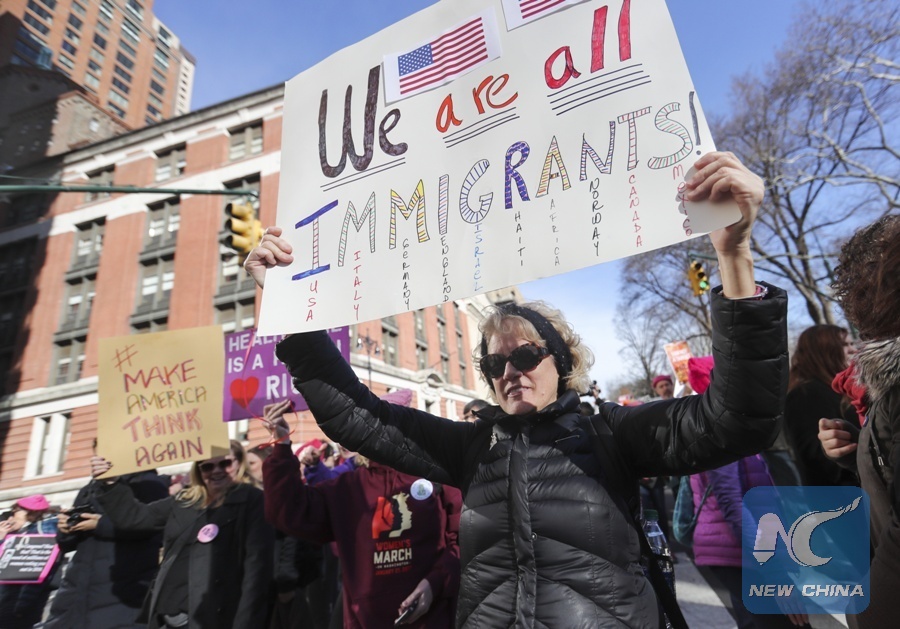
Protesters attend the 2018 Women's March in New York, the United States, Jan. 20, 2018. Tens of thousands of people took to the streets in New York City on Saturday to show support for groups including women, immigrants and people of color. (Xinhua/Wang Ying)
By Xinhua writer Yang Shilong
NEW YORK, Jan. 20 (Xinhua) -- Amid government shutdown and Women's March in cities across the United States, Saturday marks the one-year anniversary of Donald Trump's inauguration as the president of the world's most powerful state.
The 71-year-old man has been inspiring such deep emotions in his critics and supporters that many Americans have struggled to objectively assess his performance in the White House.
HARDLY ACHIEVED ANYTING VS. A FEW QUITE WINS?
"It's hard to say what he has achieved so far," said Zhiqun Zhu, a political science professor at the Bucknell University, in a recent interview with Xinhua. "In the past year, he focused on reversing former president Barack Obama's policies, from TPP to immigration, from climate change to health care, I do not think there are tangible positive outcomes from his policies so far."
"Most of his policies are controversial, from tax reform at home to declaring Jerusalem as
The United States remains "Divided States of America" and "those who do not like him continue to oppose him, but his primary support base seems unchanged," Zhu added.
Avery Goldstein, political science professor at the University of Pennsylvania, also found Trump's first-year presidency "unexpectedly divisive."
"I am disappointed that the result is a sense that policy is adrift -- more noise than action," Goldstein told Xinhua. "Dangerous rhetoric combined with what so far appear to be bluffs about taking dramatic steps."
Tommy Binion, director of Congressional and Executive Branch Relations at the Heritage Foundation, noted that Trump administration has racked up a few quiet wins.
The press has not fully covered many of the 70 bills that Trump has signed into law, nor the positive effect of many of his administration's policies on immigration, energy, and veterans, Binion wrote in a recent article titled Three Things Donald Trump did Right This Year.
For example, U.S. Immigration and Customs Enforcement (ICE) has arrested more than 100,000 people who entered the U.S. illegally, 70 percent of whom were already convicted criminals, according to Binion. ICE removed nearly 2,800 criminal gang members in the last fiscal year,
Marc Thiessen, resident fellow at the American Enterprise Institute, listed Trump's tax and regulatory reform as his first year's top three achievements.
"Trump signed the first comprehensive tax reform in three decades and removed the wet blanket of Obama-era regulations smothering our economy," Thiessen said. "We are now heading into our third consecutive quarter of above three percent growth."
Many Americans might do not subscribe to Trump's transactional foreign policy and nationalist populist worldview, said Sourabh Gupta, senior fellow at the Washington-based Institute for China-America Studies in a recent interview with Xinhua. "But there are also some important macro foreign policy actions during his first year in office which he has gotten no credit for."
"Trump, more than most, instinctively realizes that good foreign policy begins with getting relationships with all the major powers within the international system right," Gupta said. "Good strategic thinking is not about getting relations with just set major players, such as the key EU countries and Japan, right. It is about getting the relationships with all the major powers right."
TRUMP'S TWITTER VS. MAINSTREAM MEDIA
Whether you consider Trump's Twitter use the modern-day version of a fireside chat or just a plain Dumpster fire, the real estate-mogul-turned president, whose Twitter feed has 46.9 m followers, has made the social platform his own effective weapon to connect with his base supporters, and dodge the filter of the country's mainstream media, some of them Trump brands as "fake news."
Richard Perloff, professor of communication and political science at Cleveland State University, hails Trump's "aggressive, grandiose and often effective use of social media" during the 2016 presidential election and the first year of his presidency as "a revolution in political communication."
"Numerous studies show that despite the multitude of communications avenues now available, voters feel less connected to politicians and less informed about government than previous generations," said Perloff. "Donald Trump used social media to tap into this anger and bypass other communications channels to directly and authentically communicate with voters in a way many other politicians had failed to do."
Perloff's book The Dynamics of Political Communication: Media and Politics in the Digital Age seeks to assess how the digital age has changed political communication and the impact this has had on voter attitudes and good governance.
"Trump uses social media as a weapon to control the news cycle," tweeted George Lakoff, Professor Emeritus of University of California, Berkeley. "It works like a charm. His tweets are tactical rather than substantive."
According to Lakoff, Trump's tweets mostly fall into one of these four categories -- pre-emptive framing, diversion, deflection and launching a trial balloon.
"Each tweet gets his message retweeted so he dominates social media. Reporters, social media influencers, and many others fall for it hook, line, and sinker. Every time. They retweet, share, and repeat his messages ad infinitum. This helps Trump tremendously," Lakoff said.
As pointed out by Inderjeet Parmar, head of the Department of International Politics at City, University of London, the election of Trump to the U.S. presidency "on a platform of opposition to the Washington-based political elite" has shaken "the foundations of American power and opened new spaces for the discussion of how power works in the U.S.A."
"The economy is turning around, stocks are soaring, the unemployment rate is dropping. Big corporations are giving out bonuses to people," Sandon K. Saffier, a New York consultant, told Xinhua on Friday. "I think hopefully we'll get beyond this sort of bickering and polarization between the two sides."

